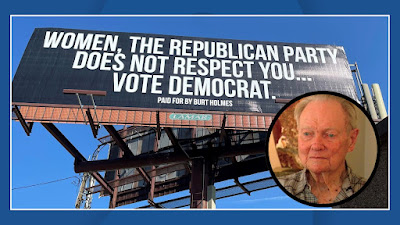'Tis the season ... the moment in election campaigns when major media try to report on the field campaigns being mounted by the various electoral combatants. For many of the reporters sent out for this purpose, the ground game is mysterious foreign territory.
I focus this post on several articles about the Trump/GOP efforts, largely on door-to-door canvassing apart from TV, other media ads, and even phoning, texting, and GOTV postcards.
In August, Semafor reported:
Donald Trump’s unconventional ground game is making Republicans nervous.
The Trump campaign and the Republican National Committee are betting the race on an unconventional approach, opting to outsource much of their turnout operation to dozens of conservative groups like Turning Point Action, America First Works and the Elon Musk-backed America PAC.
Interviews in swing states did not encourage GOP commentators:
A ... Republican strategist in a swing state said they’ve seen “no ground activity at all” and complained more typical volunteer work had been crowded out by “election integrity” efforts.
“They’re really only focused on recruiting folks to volunteer to be poll watchers,” the third Republican strategist said. “I mean, they do a lot of that shit. But what’s the point of watching the vote if you haven’t turned out the vote?”
The Washington Post pointed out that Republicans seem to be shaping their efforts based on a new Federal Election Commission ruling which allows closer cooperation between the legal Party and candidate campaigns and outside supporting groups.
... In March, the Federal Election Commission issued new guidance that opened the door for campaigns and outside groups to collaborate on turnout efforts. In the past, campaigns and official party committees, which are subject to contribution limits, generally observed a firewall that blocked information-sharing with super PACs and nonprofits that accept unlimited contributions.
Now, campaigns and outside groups are free to share messaging and exchange data. That new opportunity has allowed the Trump campaign to supplement a bare-bones in-house field program with allied programs fueled by megadonors.
Hence the Trump campaign's reliance on the likes of Turning Point USA to do its door knocking and to Get Out the Vote -GOTV.
Meanwhile, the Democrats -- the state parties and the Harris-Walz campaign assisted by unions like UniteHERE -- are not changing their past practices.
What could go wrong for the Trumpists? Plenty.
Philip Bump is a rare experienced observer of these things:
... Like the Trump Organization before it, the GOP is mostly just a collection of brands under the control of Trump himself.
This brings us back to voter outreach efforts. Such efforts, generally categorized as “get out the vote,” or GOTV, has not traditionally been one of the Republican Party’s strengths. The Democratic Party, bolstered by labor unions, had a history of strong GOTV efforts in part because its voting base was less likely to turn out of its own accord. Only in more recent elections did the national GOP match that push, investing in GOTV and in building a database of voters that could be used over multiple cycles and by multiple candidates.
For the party, this offered two benefits. It made their candidates more likely to win, given the increased ability to target specific low-propensity voters and push them to vote. More importantly, it built the party. It allowed Republicans to collect new data on voters and on volunteers. It gave them something to offer to candidates — data and resources — that could help them shape candidate campaigns and policies. This increased the institutional power of the Republican Party.
But since Trump first became the front-runner for the Republican nomination in the 2016 presidential contest, he has made obvious that he intends to suck every drop of institutional power out of the GOP for his use. ...
If, because Donald is cheap and perhaps needs the money for legal expenses, parallel organizations are left to do the door to door canvassing, do they really have the same institutional interests as the campaign? Bump doubts it.
... Who benefits from outsourcing GOTV efforts to Turning Point Action (TPA)? The youth-focused group can send its data ... back to the GOP, but it’s safe to assume that won’t be a priority. TPA is interested in building its own institutional power, and is using its strong relationship with Trump to do so. It’s building its database of volunteers and using the lure of volunteering to help Trump to do so. And, importantly, its effort will be an institutional success even if Trump loses. The central incentive is on raising and spending the $100 million Turning Point Action is budgeting for this year.
Because of the financial incentives for the organizations running these things, these para-campaign canvasses are more likely than the Dems to depend on a random collection of paid canvassers who have little personal commitment to the project. The head count becomes an important metric, regardless of what canvassers accomplish.
This work is hard. It is exhausting. It's a lot easier to just hang door hangers and count doors reached than to engage with voters. Sometimes it is easier to just go out for coffee and still get paid. And very often, that's all Republican canvassers actually do.
And now Elon Musk thinks he can buy an off-the-shelf field operation for North Carolina. A Republican is doubtful:
Whether the committee is targeting the North Carolina voters that Trump needs to carry the state is less clear. The mailers and door-hangers obtained by The Post were delivered to a longtime conservative operative in the state who was already committed to Trump and votes regularly in federal elections.
“It’s a little screwy that I’m on their list,” said the individual, speaking on the condition of anonymity to discuss campaign tactics candidly. “Stupid to waste money on someone who is a guaranteed Trump vote.”
Color me extremely skeptical that the affiliated PACs and parallel organizations can do the job as well as the organized Democratic field offices and unions can.
We saw something like this in Albuquerque during the 2004 presidential cycle, John Kerry running against George W. Bush. Some quirk of the campaign finance rules that year allowed big foundations, for the first time, to pour money into nonprofits working in parallel to the Democrats. And they did.
And it was a mess. Multiple organizations failed to communicate; door knockers carrying different flyers ran into each on the same blocks. Other areas, especially Spanish-speaking neighborhoods, never saw any campaigners at all. Groups running canvasses competed to hire from the small pool of people available to do the work; the daily rate for walking in the city climbed; canvasses had huge employee turn over. And in those early days of computerization, it was never very clear that what information canvassers collected about voters and their intentions could or would be made useful for getting out the vote.
I am reminded that that was the last year when Dems lost New Mexico at the presidential level. No one fears that any longer. The New Mexico Democratic Party has made itself enough of a coherent force that they have made a true blue state.
As Simon Rosenberg always insists, "I'd rather be us than them."
You can sign up to get involved in canvassing for Harris-Walz alongside community partners in battleground states at Seed the Vote.




























